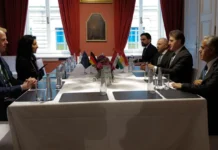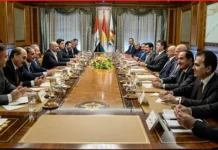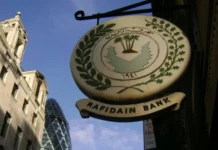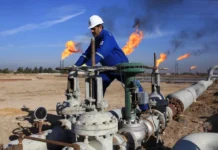Tishwash: A US delegation hosted by the Minister of Oil to discuss energy cooperation.
Today, Monday, Oil Minister Hayan Abdul-Ghani discussed with US Under Secretary of Energy James Danley and Chargé d’Affaires Joshua Harris joint cooperation between the two countries in the oil, gas, and energy sectors.
Today, Monday, Deputy Prime Minister for Energy Affairs and Minister of Oil, Eng. Hayan Abdul-Ghani Al-Sawad, received the US Under Secretary of Energy, Mr. James P. Danly, and the Chargé d’Affaires of the US Embassy, Mr. Josh Harris.
During the meeting, prospects for joint cooperation between the two countries in the fields of oil, gas, and energy were discussed.
The meeting was attended by the Undersecretary of the Ministry for Gas Affairs, Mr. Ezzat Saber Ismail, and the Director General of the Technical Department, Mr. Hassanein Abdel Latif. link
Tishwash: Al-Karawi: WTO membership will grant Iraq broad economic and trade privileges.
The Director General of the General Company for Grain Trade at the Ministry of Trade, Haider Nouri Al-Karawi, confirmed on Sunday that Iraq has completed the vast majority of its World Trade Organization accession files and is close to completing the remaining files after nearly twenty years of efforts.
He pointed out that membership will grant the country extensive economic and trade privileges, contribute to reducing customs duties, and attract international companies to invest in the Iraqi market.
Al-Karawi told Al-Iraqiya News, as reported by the Iraqi News Agency (INA), that “the process of joining the World Trade Organization requires a long period of time, and Iraq began working on this file in 2003 under the direct supervision of the Department of Foreign Economic Relations and the Minister of Trade.”
He added, “Iraq has completed the vast majority of the required files and is currently completing the final stages in preparation for formal membership in the organization,” noting that “some countries have taken more than twenty years to complete this process, so the period of time required by Iraq is no exception.”
Al-Karawi explained that “Iraq’s accession to the organization will grant it significant economic and trade privileges, most notably the protection of the rights of domestic and imported products, and the provision of joint mechanisms to facilitate trade, tax, and customs exchange with member states, which will positively impact the reduction of customs duties and the facilitation of import and export operations.”
He pointed out that “membership will help attract international companies by ensuring the protection of their products from counterfeiting and encouraging them to invest in the Iraqi market. It will also have a positive impact on lowering prices for consumers by strengthening legitimate competition and regulating markets.”
Al-Karawi explained that “Iraq is committed to implementing more than fifteen technical and legislative files as part of the accession requirements, including the file on product protection and global trademarks, which ensures that no party will imitate or market products similar to those of international companies.”
He added, “Completing these commitments gives foreign companies confidence in entering the Iraqi market link
************
Tishwash: The oil and gas law returns to the forefront, and Parliament faces a test of political will.
As the fifth legislative session draws to a close and the country enters the electoral phase, the federal oil and gas law returns to the forefront of the political scene in Iraq as one of the most sensitive pieces of legislation postponed since 2007, amid warnings that its continued obstruction will deepen the economic crisis and keep the country hostage to political disputes.
The oil and gas law is one of the most contentious issues between the federal government, the Kurdistan Regional Government, and the oil-producing provinces, as it stands at a crucial crossroads that determines the future of oil wealth management, which constitutes more than 90 percent of state revenues.
Amid repeated calls from the presidency and parliament to pass it before the end of the current session, fears are growing that its continued obstruction will disrupt the investment environment and weaken the unity of oil decision-making.
Energy expert Mohammed Hawrami believes that the continued absence of the law represents an economic and legislative failure that has had direct repercussions on oil wealth management and the general budget, as well as declining attractiveness for foreign investment in the energy sector.
Hawrami explained that postponing the approval of the law during this session means postponing the decision to a new session, along with the accompanying new tensions over powers and revenue sharing, making any further disruption costly to the national economy.
He added that the absence of a legal framework has created a state of administrative and financial chaos between the central government, the region, and the producing provinces, and has deprived Iraq of the ability to formulate a unified production and investment policy. This has negatively impacted the confidence of foreign companies awaiting stable legislation that guarantees the sustainability of their operations.
He pointed out that Iraq needs annual investments exceeding $15 billion to develop the oil and energy sector and improve refining and export capacities. However, the absence of legal regulation of contracts and financial distribution makes the investment environment risky and limits the entry of major companies into the market.
Emphasized that the current parliament’s window of opportunity is almost running out, requiring urgent action to adopt the law before the end of the session, as continued disruption means postponing any real economic transformation towards diversification and sustainable development.
For his part, Bassem Nughmish, a member of the Parliamentary Oil and Gas Committee, emphasized that the continued suspension of the law keeps the Iraqi economy mired in a cycle of rents and limits its ability to achieve balanced development
Naghamish explained that the absence of the law means the absence of a regulatory framework for managing national wealth, which confuses financial planning, leads to disparities in the distribution of revenues between the center and producing provinces, and limits the state’s ability
to implement a stable fiscal policy.
He pointed out that political disputes over powers and revenue-sharing mechanisms hinder the implementation of vital projects in the oil and energy sector and create an unstable environment for foreign investors seeking clear and stable legislation.
Naghamish added that delaying the enactment of the law deprives Iraq of billions of dollars in investment opportunities annually and weakens the state’s ability to transfer oil revenues into productive and development projects in the provinces. He stressed the need for the law to include clear mechanisms for financial governance, management of joint fields, and the establishment of a national fund for the development of producing provinces.
Naghamish concluded by saying that the next phase requires a comprehensive political and economic settlement that removes the oil issue from tensions and ensures a unified law that balances the powers of the central government and the rights of the regions, transforming oil wealth from a source of contention into a lever for development and stability. link





